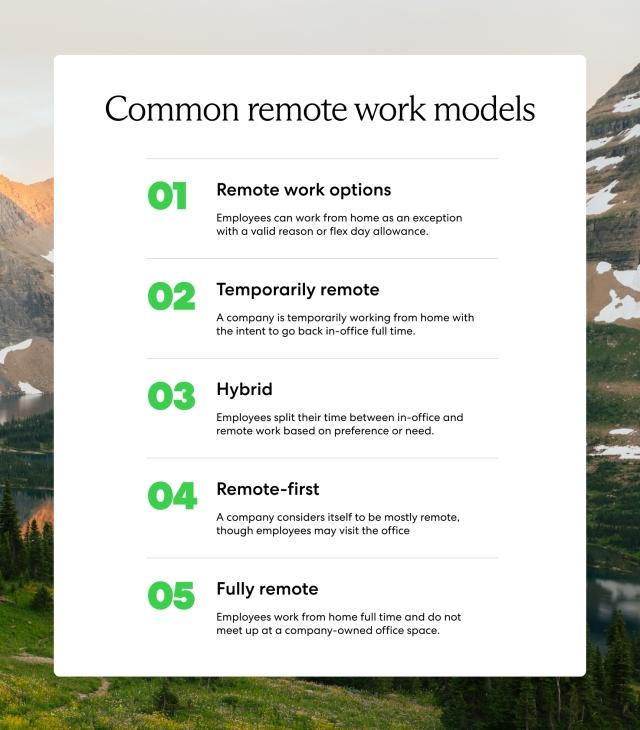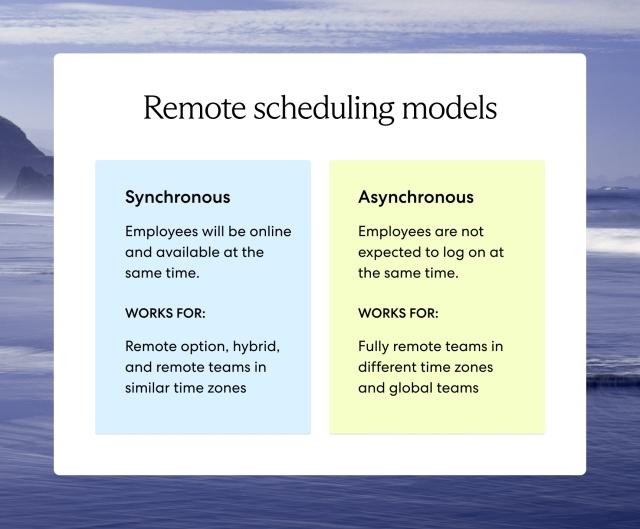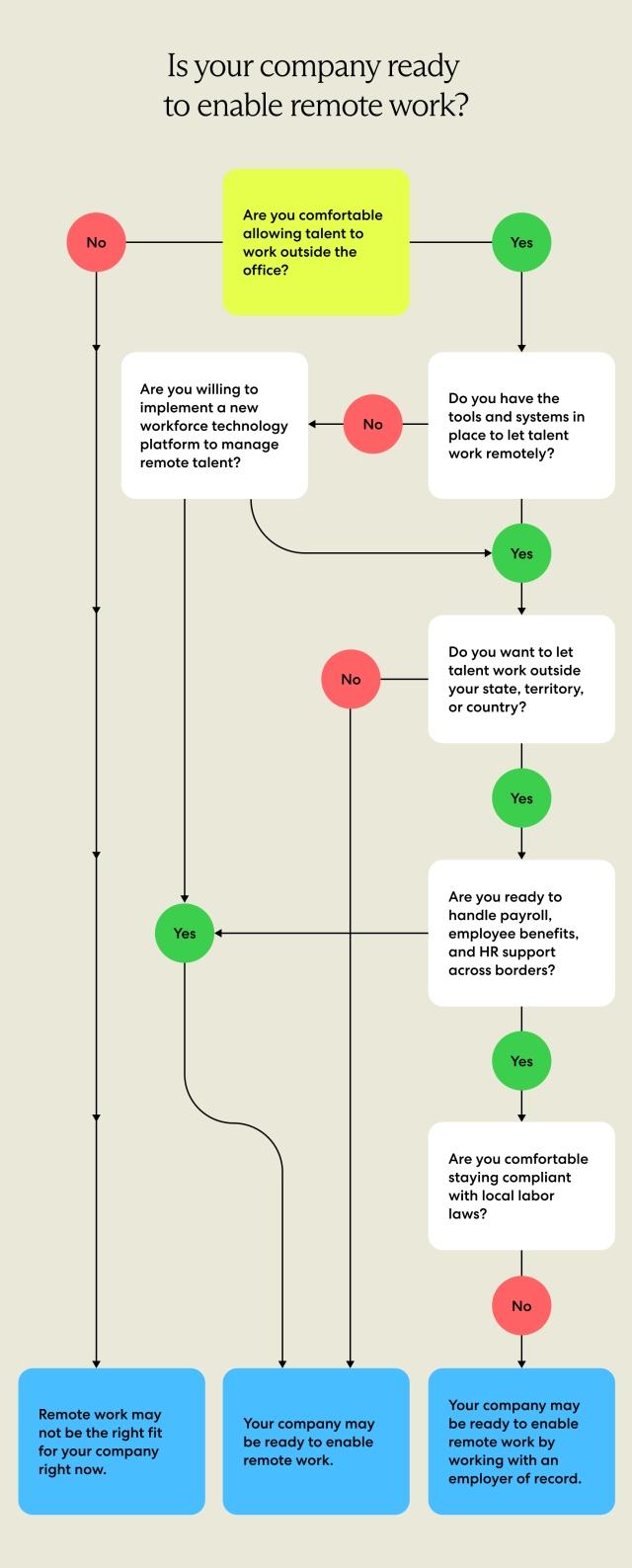By definition, a remote job is a job that an employee performs outside of a company-owned office. Under these flexible working arrangements, your employees can work from their homes, coworking spaces, coffee shops, or other places that are not company-sponsored. Remote work can be full time, temporary, or part time.
Though remote work has always existed, many companies that did not traditionally offer remote work options had their employees start working from home due to the COVID-19 pandemic. During that time, many employees began to enjoy working remotely because of its flexibility.
Now, employees everywhere are interested in working remotely in some capacity for the rest of their careers.
What does remote work mean?
Remote work—and teleworking—mean that employees have a flexible working arrangement that allows them to work from a place outside of the traditional office at least one day per week. This typically means working from their home, though others choose to travel and work from exotic locations, go to a coffee shop or library, or work from a coworking space or other destination.
The understanding with remote work is that employers allow their workforce to have more flexibility with the promise that they still complete their work in a timely manner and up to company standards.
Read more: Telework vs. Remote Work
Levels of remote work

Allowing remote work doesn’t necessarily mean your workforce is out of office full time. There are different tiers of remote work that mean your workforce can be in or out of the office, or a bit of both.
- Remote work option. Companies with a remote work option aren’t remote companies and don’t consider themselves to be, but they do make allowances for remote work. These are sometimes called “flex days” or “remote Monday/Friday,” where employees can work remotely on days they have an appointment or special circumstance, or on specifically appointed remote days.
- Temporarily remote. A temporarily remote company is fully or partially remote with the understanding that it is not permanent and employees will be expected to go back into the office at a later date.
- Hybrid. A hybrid model is a company that is split between remote and in-office employees. These companies have employees that report to an office, fully remote employees who always work from home, and some employees that do both.
- Remote-first. Remote-first companies have an office but still consider themselves remote companies. The office could be used as an occasional meeting space or a place where employees can infrequently visit. Typically, the office cannot house the entire workforce.
- Fully remote. Fully remote companies typically do not have an office for employees to visit, and all work is conducted on virtual platforms. These companies have strategies and technology in place to effectively manage a remote team.
Why do people work remotely?
Most remote employees cite flexibility as the biggest benefit of working from home. Remote jobs allow your employees to work from anywhere they want and take care of personal or familial obligations that arise during the workday. Parents of young children are especially drawn to remote work, as it can allow them to take care of their children while working.
Remote work pros and cons
While some people enjoy remote work because it allows them more freedom to travel and prioritizes work-life balance, others miss the connection with coworkers and the collaborative nature of in-office work.
Remote work pros:
- Provides more freedom and autonomy for employees
- Reduces cost of office space and supplies for employers
- Prioritizes work-life balance and flexibility
- Increases productivity among employees
Remote work cons:
- Reduces face-to-face communication between employees
- Decreases collaboration among teams
- Makes some employees feel lonely or isolated
How much do remote employees make?
According to ZipRecruiter, virtual employees in the U.S. make an average of about $53,400 per year in 2023. The remote salary range goes from about $28,500 to about $79,000, depending on the type of remote work and experience. For example, there are several high-paying remote jobs in the tech industry.
Remote employees don’t need to worry about earning less than their in-office counterparts. In fact, employers have noted that they don’t plan to dock the pay of employees who choose to go remote full-time and will hire fully remote employees at the same rate as in-office employees.
How do remote jobs work?

Remote jobs often make use of technologies like video conferencing, instant messaging services, digital calendars, and communication platforms to keep their workforce aligned and connected.
While working remotely, employees are expected to check in via these platforms and tune in to any mandatory meetings that are held over a video conferencing service. Work is often turned in via email or a project management software, and feedback or notes are given virtually.
Your remote teams can work synchronously or asynchronously, depending on the time zones where the team is located.
- Synchronous work. Your entire team logs on and off at the same time. Video meetings can be held for the team and there is an expectation that messages will be answered quickly.
- Asynchronous work. Your team is not expected to be online at the same time and work is done independently with little collaboration. Messages do not need a quick response and team members in different time zones or who do not work at the same time do not depend on each other to get work done.
Is remote work effective?
Most companies that have gone remote report that it has been a success—87%, to be exact. Employees reported that their productivity from home is on par with or greater than it was in the office.
Most employees attribute their productivity to the ability to work when it’s convenient for them. Someone who doesn’t function well early in the morning can get started later and work later, meaning they will spend their most productive hours working. If they had to be in an office by 9, they might spend the first few hours of their day idle.
Should your talent work from home? Remote work considerations

Remote work is an ideal option for many companies, but there are a few factors to consider before switching to a remote model. For example, going remote forces you to rethink the way you handle HR, daily work, remote talent management, and more.
A few questions to ask yourself before enabling remote work for your talent:
- Do we have the systems in place to let talent work remotely?
- Are team leaders comfortable managing talent from outside the office?
- Will we let talent work remotely outside our jurisdiction in new states, territories, or countries?
- If we let talent work in new jurisdictions, are we prepared to comply with local labor laws in those markets?
- Do we have the financial, legal, and HR resources to support talent working remotely in new markets?
What jobs can be done from home?
Virtually any job that is done on a computer or phone can be done from home. Popular remote work includes things like sales, technology, marketing, graphic design, content creation, or web development.
Over the past year, though, some jobs that have been traditionally hesitant to allow remote work, like financial or defense positions, have begun allowing their employees to work from home. Others that may not seem fit for remote work — like health care and construction — are also starting to find ways to make it work.
According to Think Remote, the following jobs are considered some of the best remote jobs in 2023:
- Software developer
- Data entry specialist
- Virtual assistant
- Product manager
- Actuary
- Information security analyst
- Digital marketer
- Transcriptionist
- Content Writer
- Translator
- Social media manager
- Web designer
- Onboarding specialist
Remote working for global teams
A huge benefit of remote work is that it opens companies up to the many benefits of global teams. The global candidate pool has a large amount of talent that can help grow your business and bring in new perspectives.
Businesses who are looking to create a dispersed team need to become prepared to manage projects across time zones. Good communication is essential for teams working remotely across the globe because people will be logging on at different times.
It’s also important to comply with international labor regulations. Different countries have their own employee protections, holidays, and laws, so keeping track of them all may become a headache.
In that case, an employer of record (EOR) can help you easily build and manage your team.
Build your dream remote team with an employer of record
Partnering with an EOR like Velocity Global makes it easy to build and manage a distributed workforce. Whether you’re hiring talent across state lines or international borders, an EOR helps you compliantly hire, pay, and manage anyone, anywhere.
Our EOR solution simplifies the employer and talent experience with cloud-based technology and unmatched HR support in more than 185 countries.
Or contact us to start building your distributed dream team.
Topic:
Worker Guides



